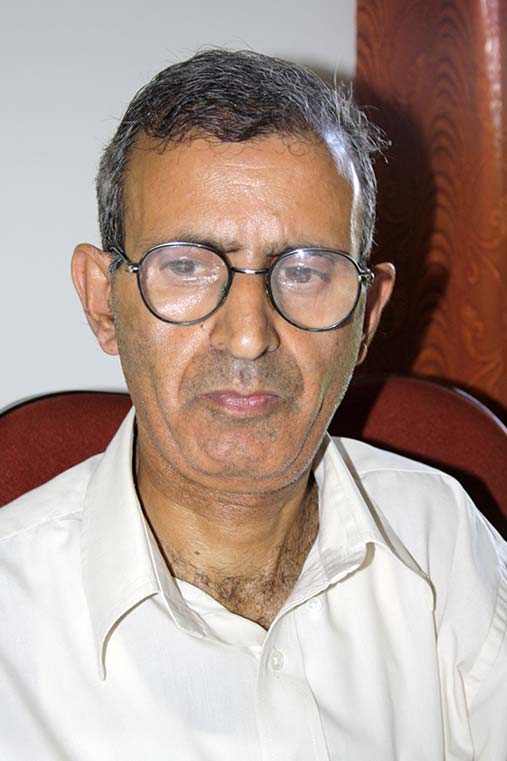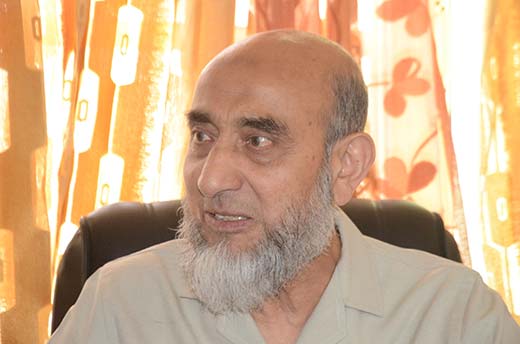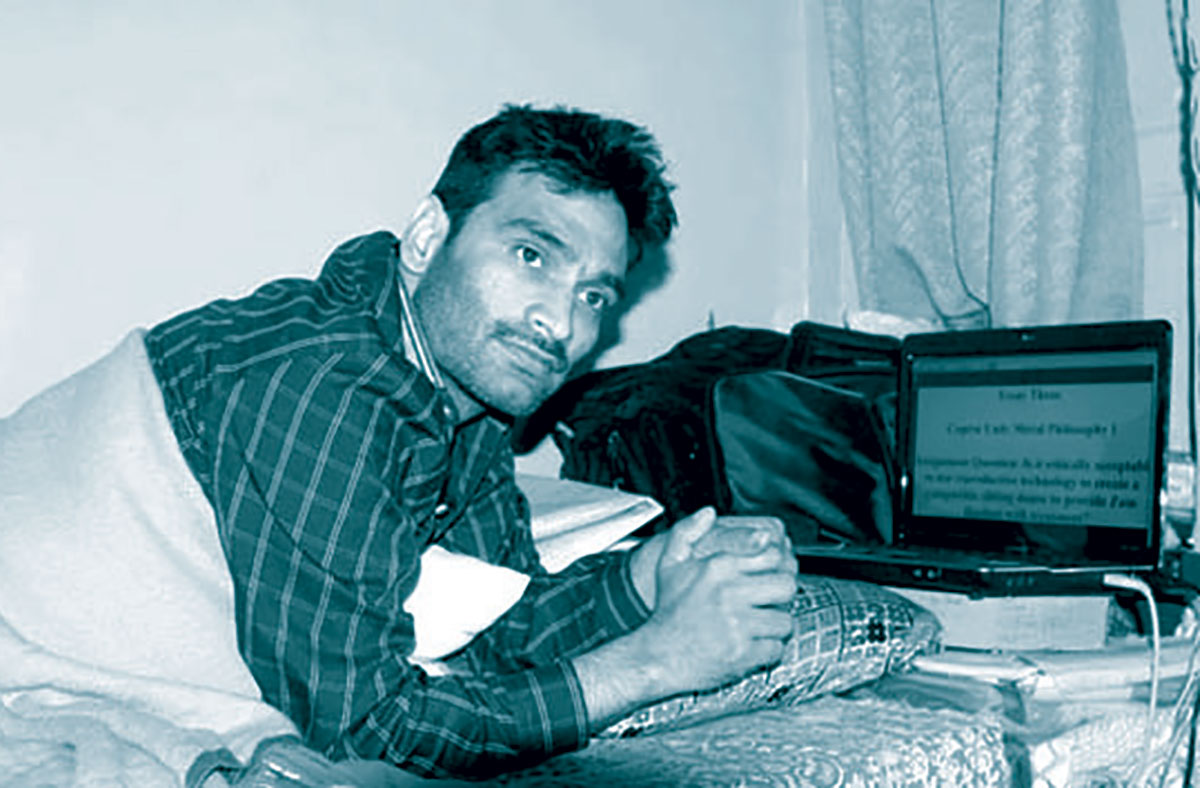Social service and philanthropy are necessary to take care of the less privileged in the society. With two decades of conflict leaving thousands of widows and orphans, philanthropists in Kashmir are getting organised to look after the needy. Aliya Bashir reports.

People have always been helping the poor and the needy in Kashmir, which has a tradition of voluntary community work, called Halshri in local parlance. Muslim.
Most of the philanthropy was done on an individual level, however with the two-decade long armed insurgency taking a huge toll on life and property many charity organisation have come up in Kashmir. Earlier the institutions used for social service were Mohalla or neighbourhood based, mostly run by the local mosque committee. The lone government department meant for looking after the very poor, Madr-i-Meharbaan Welfare Institute died a silent death. However, it was replaced by the Social Welfare Department of the government.
Kashmir having a predominantly Muslim population, major components of charity are Zakat (Islamic wealth tax) and sadqat (general donations).
Independent estimates put the number of widows in Kashmir at more than 35000 with around 100000 orphans, where a separatist insurgency has been going on for more than two decades. Many non-governmental organisations came up to look after the impoverished. The 2005 earthquake also reinforced the need for organised charity work.
Anirudh Suri, did research on NGOs in Kashmir in 2003. The research was sponsored by Institute of Peace and Global Citizenship at Haverford College, Pennsylvania, USAHius report titled, ‘NGO’s in Kashmir.
 “The spurt in the growth of NGOs has been spread over different domains. Since the government was found to be lacking in many areas and people started to make a genuine effort to establish civil society through orphanages, self-help groups, medical care, rural development and employment generated-oriented groups, widow care, disappearances, environmental and awareness groups,” the report said.
“The spurt in the growth of NGOs has been spread over different domains. Since the government was found to be lacking in many areas and people started to make a genuine effort to establish civil society through orphanages, self-help groups, medical care, rural development and employment generated-oriented groups, widow care, disappearances, environmental and awareness groups,” the report said.

Sociologist Dr BA Dabla says that philanthropy does not have a proper social orientation in Kashmir as the majority of the philanthropy in Kashmir is done at an individualistic level. “Most of the people in Kashmir either belong to the middle class or lower middle class who don’t give money to institutions. But, those who belong to upper class do give donations to charity institutions,” he says.
Dabla says that the individualistic approach cannot be so helpful and productive as compared to proper channelling through institutions. “We should develop the mindset for social help to follow the modern objectives scientifically so that it benefits larger sections of the society,” he adds.
Social activist AR Hanjura feels that both human rights violation and earthquake provided a new platform for the people to explore different means of social work, beyond the Islamic obligation to give alms in the month of Ramadhan.
“Corporate sector can have a pivot role in social intervention to generate money and resources for social services. For organised social work which is through institutions, one has to face a lot of difficulties in Kashmir like both government and people doubt the credibility and intentions (of those running the institutions) which is one of the main reasons why people shy away from charity organisations and prefer helping help at the individual level,” he says.
Individual charity still continues to major part of the charity however, some organisations both registered and unregistered are doing their bit and addressing the needs of local people.
Institutional Philanthropy
Yateem Trust is the first orphanage in the Valley which was established in 1972 to facilitate the education orphans and work for the upliftment of widows and poor girls.
Abdul Khalik Tak along with few associates gathered orphans from different other parts of the valley to create awareness about the condition of orphans and widows. Gradually the trust grew and became one of the biggest charitable organisations of the valley.
At present, the trust has around 40 sub-district offices helping thousands of widows financially and seven orphanages with 400 children on roll. The trust gets all its money from donations and has an annual budget of more than four crore rupees.
Jammu and Kashmir Yateem Foundation established its ‘Bait-ul-Hilal orphanage’ in 2000 CE with a corpus amount of Rs 5 lakh donated by its founder members and their friends. The orphanage houses 50 boys between six to 15 years of age. The foundation also runs an orphanage in Souch Kulgam under the same name (Bait-ul-Hilal) which houses another 27 boys. The foundation has also provided financial help for marriages of 500 orphan and poor girls, besides running a few scholarship programmes.
In the financial year 2009-2010, the organisation received donations of around in Rs 2.21 crore.
Sakhawat Centre is a constituent of Iqbal Memorial Trust, one of the major networked private charitable organisations in the state. The Centre helps thousands of orphans and destitute through its around 200 centres scattered across the state.
Established in 2005, the centre provides financial assistance to orphans in their homes and supports the education of 6000 students, mostly orphans.
The Centre also runs vocational training programmes for girls and women and helps them in establishing income generating units. The annual budget of Sakhawat Centre depends is more than two crore rupees, all of which comes from local donors.
Established in 1998, Muslim Welfare Society Srinagar started an orphanage under the name of Yateem Khana in Bemina, Srinagar. The orphanage was started by a few people with 15 orphans in the first batch. Currently there are 350 boys in the orphanage.
Its annual budget is more than rupees one crore.
Shehjaar, part of HELP (Human Efforts for Love and Peace) Foundation has been rendering relief and help to hundreds of poor people, mostly children and women through self-help programmes.
Shehjaar was started in 1998, by Nighat Shafi Pandit in a small building in Saidakadal with just eight children. At present, around 500 children from Kashmir and 80 from Jammu are supported by the organisation. The foundation provides assistance for their education in their homes so that they continue their studies without leaving their homes. It runs around 10 vocational centres, where women are imparted various skills so that they earn a respectable livelihood. The annual budget of Shehjaar is around 30 lakh rupees and all of it comes from local donors.
Some initiatives taken by dedicated individuals have resulted in the formation of institutions which take care of the less privileged.

Dr Mir Mohammed Maqbool, a leading ENT specialist, wanted to help the disabled and marginalized sections of the society. He founded the Voluntary Medicare Society (VMS), J&K and a special school for physically disabled and mentally challenged children.
The socio-medical organisation envisaged to treat and rehabilitate differently physically or mentally challenged people and poverty-stricken people. Dr Maqbool put in his own money and some money from relatives and friends to establish Shafaqat – a special school for children suffering from mental, speech or hearing impairments at Bemina, Srinagar on November 7, 1995.
There are 75 children on roll in the school, while 300 others are provided vocational training. The poor among them are not charged any fee. As the school’s operations grew, so did its financial requirements, which are fulfilled by public donations. Most of the funds come as Zakaat from his friends and relatives.
“If we are in a position to help the needy through various means, we shouldn’t hesitate to come forward. If we have the desire and will to help our society, money is no issues,” says Dr Maqbool.
Javed Ahmad Tak, 36, is a social activist, who set up a school for the disabled at Bijbehara in south Kashmir. Javeed’s life took a twist when unidentified gunmen shot him several times leaving him wheelchair-bound. After a period of severe depression, he started free tuitions for poor children besides pursuing his studies.
In 2006, he started raising funds for rehabilitation of disabled persons. He received around 17000 rupees in the first year, which later grew to Rs 1.5 lakh a year.

Besides providing free tuitions, scholarship programs and computer training, Javed established – Zaiba Aapa Institute of Inclusive Education, a special school in 2007. All expenses came from his ex-gratia relief of 75 thousand rupees. When the school started to gain popularity, a Delhi-based NGO – Cry (Child Relief and You) helps them with Rs 7 lakh every year.
“Philanthropy is the moral duty of a person. We should be always ready to help others with the mindset that Allah has given us various abilities, which should be utilized,” Javeed says.
Syed Mohd Hussain Haqqani, 56, a teacher, runs guidance programmes for Hajj pilgrims.
Haqqani organised the first-ever Hajj guidance programme in Kashmir for aspiring pilgrims. He started the program at his own house and later on went off to far off places to organise such programmes. The state government approached him to organise state-level Hajj guidance programme. Besides, this on his visit to different villages, he identified the needy people and helped them by collecting donations for them locally, mostly from the village itself.
“If we cannot help monetarily, we are expected to give of our time and in any act of giving, the goal is to strip ourselves of selfishness and to think of our community,” he says.
In 2008, Rizwan Rasool and Syed Yasir Qadri thought of doing some charity while studying law at Kashmir University. It took them three months to host a cultural-cum-musical show, Ehsaas at the university to raise funds for lepers. The duo raised Rs two lakh from the program.
“We had no money or any financial support. But we were sincere in our efforts and succeeded to persuade the university authorities and sponsors to make the show a success. Anyone with enthusiasm can utilize his efforts to contribute towards the society through effective means,” feels Rizwan, who organised the show along with his friend.
Most of the donations in Kashmir are made in the holy month of Ramadhan. People can be seen offering donations in cash and kind at orphanages and other charities. The people associated with charities say that only the orphanages receive around Rs 15 crore in a year. There are other institutions like seminaries which also get a large amount of donations. “To manage the Darul-ul-aloom we take loans throughout the year and we are able to pay back only through contributions in Ramadhan,” says Mufti Abdul Rasheed of Darul-ul-uloom Bilalia, Lal Bazaar Srinagar.
Most orphanages and religious schools advertise their activities, requirements, and bank accounts in local media asking for donations. A few hire cars and use public address systems to secure donations.
Zakat is an obligation for Muslims in which they have to pay 2.5 per cent of their saving in cash or gold.















